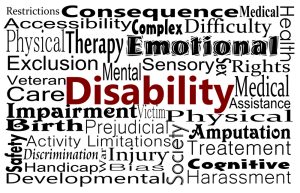Call Us At: 949-679-9909
How Employers Violate FEHA’s Disability Discrimination Law

Common Ways Employers Violated FEHA’s Ban On Disability Discrimination
It is illegal under the federal Americans With Disabilities Act (ADA) and California’s Fair Employment and Housing Act (FEHA) to discriminate against employees and job applicants based on a disability. If you live in California and are disabled, the FEHA gives you more protections than federal law. It applies to any employer with five or more employees and has no cap 
on the amount of pain and suffering and punitive damages a discrimination victim can recover. The ADA requires the impairment to substantially limit one or more major life activities; however, under California law, a disability is defined as “an impairment that makes performance of a major life activity ‘difficult.’” Ultimately, this definition protects more people.
Discrimination is banned in all aspects of employment, including hiring, salary, benefits, and promotions. Although these laws have been in effect for decades, some employers continue to violate them and wrongfully discriminate against employees and applicants with disabilities. This costs discrimination victims thousands of dollars in lost wages, employment opportunities, and career growth.
Common Ways Employers Violate FEHA’s Reasonable Accommodation Provisions
Under the FEHA, unless it would cause an employer undue hardship, he is required to make reasonable accommodations for applicants and employees with a disability, allowing them to continue to perform essential duties of their jobs. Employers have an affirmative duty to make reasonable accommodations when they become aware of an employee’s disability. In a 2016 California Court of Appeals case, the court extended FEHA’s discrimination protections against people with disabilities, requiring that employees associated with a disabled person be given reasonable accommodations.
Despite FEHA’s strong protections against discrimination, some employers continue to fail to provide reasonable accommodations to employees with disabilities. Common ways they violate these requirements include:
- Failing to recognize accommodation requests. Employers often fail to recognize when an employee has requested an accommodation for his disability. The best practice would be for the supervisor who receives such a request to direct the employee to the human resources department where the employee’s concerns would be addressed.
- Requesting too much medical information. Under the FEHA, an employer can only ask for medical documentation if the employee’s disability or need for accommodation is not obvious. The employee only needs to provide a doctor’s note or other medical document confirming his disability. Employers who request more medical documentation are in violation of the Act.
- Sharing medical information. Employers frequently violate FEHA and possibly other medical privacy laws by sharing medical information concerning the employee’s disability with other employees who do not need to know this information.
- Denying an accommodation request. Even if the employee does not suggest or expect a solution to his need for an accommodation, an employer should not just deny the request. An employer has an affirmative duty to engage in the interactive process—communicating with the employee to determine a reasonable accommodation.
- Using the “it’s not been done” defense. Some employers wrongfully believe they can deny an accommodation request because it has not been done before. This is not a valid defense under the FEHA, which gives employees broad protections under the law.
- Failing to consider other leave laws. A disability could be considered a serious medical condition entitling the employee to leave under the Family and Medical Leave Act (FMLA). Many employers fail to consider this and violate their employee’s important legal rights.
- Claiming the undue burden defense. Many employers try to use the undue burden defense broadly, claiming an accommodation would be too costly. The reality is that most accommodations are relatively inexpensive, and employers cannot use this defense to deny legitimate requests.
- Failing to document the process. Many employers fail to document how an accommodation request was handled or what happened during the interaction process.
Are you an applicant or an employee who faced discrimination based on your disability? You have rights under the FEHA. Call the Law Offices of Corbett H. Williams at 949-401-7547 to schedule a free, no-obligation consultation to discuss your legal options with an Irvine employment lawyer. We can help determine if you’re eligible for compensation.
| Related links: |
No Legal fees unless you recover
The law offices of Corbett H. Williams takes most employee cases on a contingency fee basis
meaning that if we take your case, you pay nothing unless we recover for you.
Contact Us Today For a Free Case Evaluation Reliable & Trusted
If you are the victim of unlawful employment practices, including wrongful termination, sexual harassment, discrimination, or have not been paid all wages and benefits you are entitled to, the Law Offices of Corbett H. Williams can help. Call us today at 949-528-4220, or take a moment to fill out an online contact form for a prompt response. Delay could result in the loss of your claim, so don’t wait.
Request Your
Free Consultation
Fields Marked With An “ * ” Are Required

The Law Offices of Corbett H. Williams is always prepared to get clients started down the road to a more secure future. Take the first step and contact the firm today. The attorney will take care to answer questions and help decide what the most effective next step can be.

